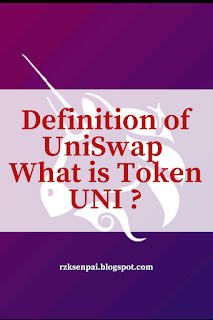Definition of UniSwap, What is Token UNI ?
Digital assets in 2021 are welcomed by many people, some parties and public figures are also investing some of the money in crypto digital assets, just take for example Tesla, tesla company has spent $ 2 billion US. Netflix will reportedly invest its huge funds into crypto.
Well, in this article we will discuss one of the Crypto ASSETS UNI (UNISWAP). Wondering what UNISWAP is? Read the article made by rzksenpai.
Things to discuss:
- What is Uniswap?
- How Uniswap Works
- Advantages and Disadvantages of Uniswap
What is Uniswap or crypto UNI?
Uniswap is included in the DEX or in the sense of Decentralized Exchange. DEX is a decentralized digital currency exchange.Uniswap is the same as Ether which runs on the Ethereum blockchain network. Uniswap
Running on the Ethereum blockchain network, Uniswap Protocols such as Eth offer crypto asset services with the DeFi/Decentralized Finance system. DeFi was invented by Hayden Adams that works to exchange ERC20 for sellers and buyers, you can also exchange UNI.
UNI is the original Token belonging to Uniswap. UNI is a designation for native tokens belonging to the Uniswap protocol. UNI gives the freedom of the right of governance to freely vote when the protocol changes to owners who own UNI tokens.
Read : Fork Meaning on Cryptocurrency
How Uniswap Works
Uniswap has something special in creating liquidity. That is by using the formula X × Y = K.Illustrations like this:
You have an ETH Token and want to exchange it for ERC20, let's just take the example of ERC 20 which is MKR Token.
X = ETH and Y = MKR, and K is the result of X and Y where the value is constant.
Uniswap mechanism in setting and increasing prices. When people exchange ETH Tokens for MKR Tokens, it means that the MKR stock will decrease and the ETH stock will increase. Because the MKR Stock decreases in price will increase, conversely the stock rises in price will decrease.
Read : Popular, 10 Podcast Cryptocurrency

.png)
0 Response to "Definition of UniSwap, What is Token UNI ?"
Post a Comment